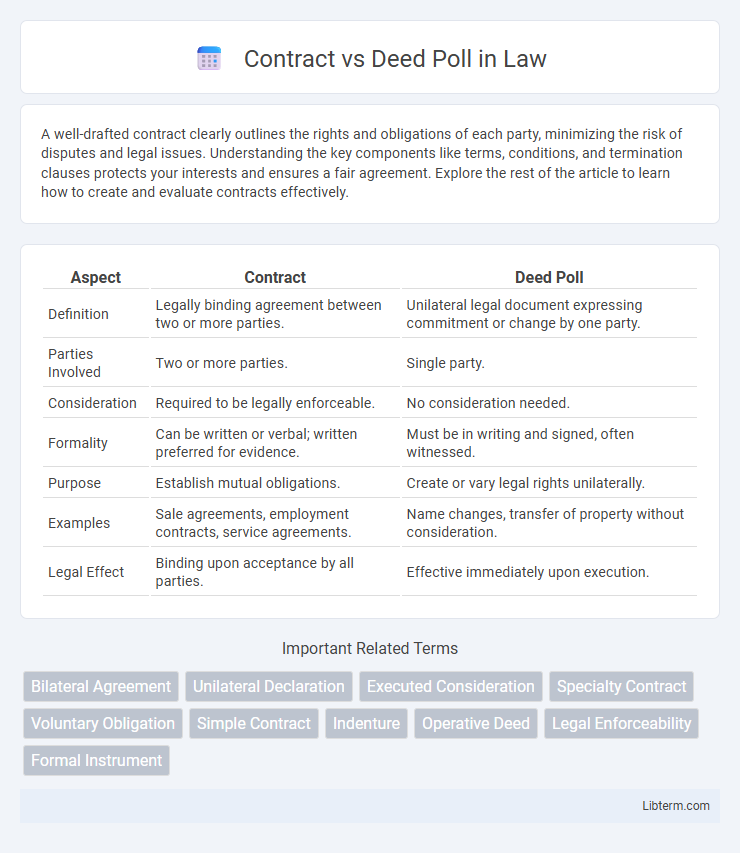A well-drafted contract clearly outlines the rights and obligations of each party, minimizing the risk of disputes and legal issues. Understanding the key components like terms, conditions, and termination clauses protects your interests and ensures a fair agreement. Explore the rest of the article to learn how to create and evaluate contracts effectively.
Table of Comparison
| Aspect | Contract | Deed Poll |
|---|---|---|
| Definition | Legally binding agreement between two or more parties. | Unilateral legal document expressing commitment or change by one party. |
| Parties Involved | Two or more parties. | Single party. |
| Consideration | Required to be legally enforceable. | No consideration needed. |
| Formality | Can be written or verbal; written preferred for evidence. | Must be in writing and signed, often witnessed. |
| Purpose | Establish mutual obligations. | Create or vary legal rights unilaterally. |
| Examples | Sale agreements, employment contracts, service agreements. | Name changes, transfer of property without consideration. |
| Legal Effect | Binding upon acceptance by all parties. | Effective immediately upon execution. |
Introduction to Contract and Deed Poll
A contract is a legally binding agreement between two or more parties that outlines mutual obligations and rights, requiring offer, acceptance, consideration, and intention to create legal relations. A deed poll is a unilateral legal document executed by one party to express an intention or change, such as a name change, without needing acceptance from others. Understanding the fundamental differences between contracts and deed polls is essential for recognizing their unique legal functions and enforceability.
Defining a Contract: Key Characteristics
A contract is a legally binding agreement between two or more parties that outlines specific rights and obligations enforceable by law. Key characteristics include offer, acceptance, mutual consent, consideration, and the intention to create legal relations. Unlike a deed poll, a contract requires consideration and involves bilateral commitments between parties.
What is a Deed Poll?
A Deed Poll is a legal document executed by a single party to express an intention or make a binding commitment, commonly used for changing a person's name officially. Unlike a contract that requires two or more parties' agreement, a Deed Poll is unilateral and must be signed, witnessed, and delivered to be valid under common law. This document serves as evidence of the change or promise and is often registered with governmental authorities to ensure public recognition.
Legal Differences Between Contract and Deed Poll
Contracts require mutual consent and consideration from all parties involved to be legally binding, whereas a deed poll is a unilateral legal document executed by a single party without consideration. Contracts must demonstrate offer, acceptance, and exchange of value, while deed polls rely on formal execution, such as signing and witnessing, to take effect. The enforceability of contracts stems from mutual obligations, whereas a deed poll is used to declare or change a legal status, often without reciprocal commitments.
Formation Requirements: Contract vs Deed Poll
Contracts require mutual consent, consideration, and an intention to create legal relations between two or more parties, typically evidenced by offer and acceptance. Deed polls are unilateral documents executed by a single party, requiring formalities such as being signed, witnessed, and delivered to be legally effective. Unlike contracts, deed polls do not need consideration but must comply with specific statutory rules to be valid, often involving clear expressions of intent and proper execution.
Parties Involved: Mutuality vs Unilateral Intent
A contract involves mutual consent between two or more parties, where each party agrees to specific obligations, ensuring mutuality of intent and enforceability. A deed poll is a unilateral legal document executed by a single party to express an intention or make a binding declaration without requiring acceptance or agreement from others. The distinction in parties involved highlights that contracts depend on bilateral or multilateral acceptance, whereas deed polls reflect individual, unilateral intent.
Common Uses of Contracts and Deed Polls
Contracts commonly facilitate agreements involving the sale of goods, services, employment terms, and property transactions, establishing legally binding obligations between parties. Deed Polls are primarily used to effect personal changes such as name alterations, allowing an individual to formally declare their new identity. While contracts require mutual consent and consideration, deed polls are unilateral declarations accepted for specific legal purposes.
Enforceability and Legal Binding Nature
A contract is a legally binding agreement between two or more parties that requires offer, acceptance, and consideration to be enforceable in court. A deed poll is a unilateral legal document signed by a single party, often used for actions like changing a name, and does not require consideration but must be executed as a deed to hold legal effect. Enforceability of a contract depends on mutual consent and elements like consideration, while a deed poll's enforceability is grounded in its formal execution and intent to be legally binding without needing other party involvement.
Advantages and Limitations of Each Instrument
A contract offers mutual obligations and enforceable promises between parties, providing flexibility to tailor terms specific to business or personal agreements, but it requires consideration and mutual consent to be valid. A deed poll creates a unilateral, legally binding declaration or change, such as name changes or property transfers, with stronger evidentiary weight since it does not require consideration, yet it lacks enforceable reciprocal obligations. While contracts enable negotiated terms and remedies for breach, deeds polls offer simplicity and definitive execution, but their one-sided nature limits applicability to scenarios requiring mutual agreement.
Choosing Between a Contract and Deed Poll
Choosing between a contract and a deed poll depends on the intent and legal requirements of the agreement or declaration. A contract involves mutual obligations and requires offer, acceptance, consideration, and intention to create legal relations, making it suitable for agreements between parties. Conversely, a deed poll is a unilateral legal instrument used to formally declare or change a status, such as a name change, and does not require consideration or mutual consent.
Contract Infographic

 libterm.com
libterm.com